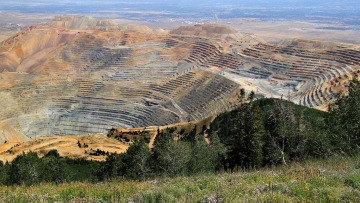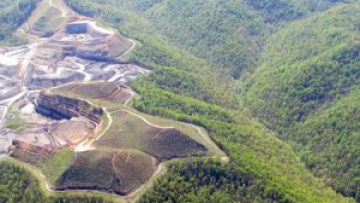NGOs criticise poor performance new leadership Deutsche Bank
Barbara Happe, urgewald, +49 (0)172-681 44 74
Thomas Küchenmeister, Facing
Finance, +49 (0)175-49 64 082
David Hachfeld, Oxfam Deutschland, +49 (0)176
24 11 23 61
Barbara Happe, urgewald, +49 (0)172-681 44 74
Thomas Küchenmeister, Facing
Finance, +49 (0)175-49 64 082
David Hachfeld, Oxfam Deutschland, +49 (0)176
24 11 23 61
Urgewald - Facing Finance - OXFAM -Dachverband der Kritischen Aktionärinnen und Aktionäre
A day before Deutsche Bank's annual
shareholders meeting, German NGOs criticise the new leadership of the bank,
Anshu Jain and Jürgen Fitschen, on their poor sustainability performance. "A
year ago, the new leaders promised a fundamental shift in the bank's business
towards an ethical and ecological responsible bank. However, this is not taking
place" says Dr. Barbara Happe of the environmental and human rights organisation
urgewald. According to Happe, profit at the expense of people and the
environment remains at the heart of Deutsche Bank's business
model.
Recent research by urgewald and Facing Finance reveals that Deutsche Bank continues to provide
money to companies that ignore environmental and human rights issues and damage
the climate. For example, the bank still issues bonds and shares for arms
manufacturers that deliver arms into conflict areas, as well as for nuclear
companies. It also continues activities on food speculation.
"Just the
financial services of Deutsche Bank for 7 of the 10 most controversial companies
account for more than 2.8 billion Euro" laments Thomas Küchenmeister of Facing
Finance. He refers to a ranking of RepRisk, an agency that informs banks about
the ecologic and social reputational risks of their clients. Deals with arms
manufacturers alone already amount to nearly 1 billion Euro, despite the fact
that the bank claims in its sustainability report that it no longer offers any
financial product that is directly linked to nuclear weapons, cluster
ammunition, land mines or human rights violations.
"Deutsche Bank
continues to conduct business with producers of nuclear weapons and cluster
ammunition, albeit less deals with the latter", says Küchenmeister. He
criticises financial relations of Deutsche Bank with arms manufacturers such as
Rheinmetall, a manufacturer that produces weapons in, and
delivers weapons to countries that disregard human rights.
Deutsche bank
also continues to support companies involved in Mountain Top Removal coal mining practices. This mining,
conducted in the Appalachian Mountains in the US involves literally blasting
away the top of a mountain, leaving the landscape destroyed and the mining waste
ending in the rivers poisoning the drinking water. Paul Corbit Brown,
spokesperson of the organisation 'Keeper of the Mountains' that resists the
destruction of the region for coal mining, came over from the US to confront the
bank with the impact of MTR.
"Deutsche Bank has provided money to Alpha Natural Resources and Arch Coal, companies that exercise this type of mining. The
bank doesn't exclude this kind of companies from financing, which is
irresponsible", criticises Corbit Brown.
Deutsche Bank also counts
amongst its clients the controversial Rio Tinto mining company, one of the world biggest producers of
uranium. Its 'Roessing' mine in Nambia, the world's third largest uranium mine,
consumes as much water as the Namibian capital Windhoek. "In a arid country such
as Namibia this high water consumption of Roessing is a huge problem. Further,
mining workers and neighbouring communities are suffering from health problems.
Not surprising since the uranium concentration in the groundwater, soil and
sediment has strongly increased. Deutsche Bank should not support such clients",
demands Bertchen Kohrs of the environmental organisation Earthlife
Namibia.
Deutsche Bank is big in food speculation too. "The investment
funds of Deutsche Bank invested 3.79 billion Euro into bets on the price of food
commodities, such as wheat and corn", explains Oxfam's expert David Hachfeld.
"Food speculation increases the risk of price fluctuation and hunger. Poor
people in developing countries can't afford basic food if the price is rising.
Deutsche Bank knows the risk, but prioritise the profit." Last year the bank
even broke its promise to shelve the establishment of new funds until having
finished a research into the risk of speculation increasing hunger. However,
according to research conducted by Oxfam, Deutsche Bank last year launched five
new investment funds speculating on prices of agricultural raw
materials.
Taking into account this vast range of critique, NGOs rate
Jain's and Fitschen's first year performance as very poor. They have summarised
their judgement in a school report, which will be handed over to shareholders at
the meeting. They call upon shareholders to donate their dividend to communities
suffering from the bank's business.


